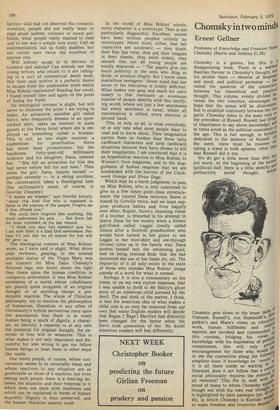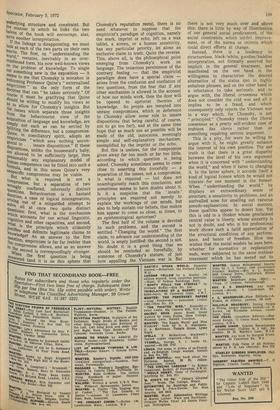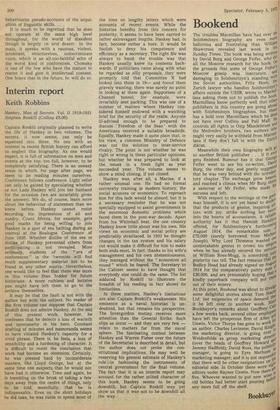Chomsky in two minds
Ernest Gellner
Problems of Knowledge and Freedom Nuaffl Chomsky (Barrie and Jenkins £1.50) Chomsky is a genius, but this is Aa disappointing book. There is a marked Kantian flavour to Chomsky's thought, au his double fame — theorist of language and mind, and political protester — 115! raised the question of the connectias; between his theoretical and practical thought. This volume, evenly divided be" tween the two concerns, encourages th,e hope that the nexus will be illuminate' But to establish continuity between the tWe parts, Chomsky relies in the main onlY the precedent of Russell. Russell had thiugo of importance to say about knowledge, Of at times acted as the political conscience °5 the age. This is fair enough, in lecturen dedicated to the memory of Russell. A r the same, there must be reasons for taking a stand in both spheres, other tba that Russell did it too. . . . We do get a little more than this, bildt not much. At the beginning of the sec°116 (political) half, there is a little sketchy ane perfunctory social thought, bef°I.
b., of Chomsky gets down to the brass Vietnam. Russell's, von Humboldt's, P":?;11, potkin's and Marx's views on educatlated work, human fulfilment and re matters are invoked and commended' this context, bridging his vieWS i.cal knowledge with his expression of Polide commitment, this will only Pr°'iii‘e encouragement for those who would ',:og to see the connection along the foll°W; if simpliste lines: if knowledge be innate' be it is all there inside us waiting t°,.ect liberated, does it not follow that a Or; Of social philosophy requires the removll'oe all restraint? This fits in well With 0, mood of many to whom Chomsky aPP,e 0 though not with his own real thougill"spd is highlighted by later passages (pp. 4540 46), in which Chomsky is Kantian en'A 00 to make freedom and creativity depen"
Underlying structure and constraint. But the manner in which he links the two halves of the book will encourage, alas, quite another interpretation.
If the linkage is disappointing, we must look at each of the two parts on their own merits. The first, on "understanding the World," restates, inevitably in an overcondensed form, his now well-known views O n the problem of knowledge. To single ont something new in the exposition — it seems to me that Chomsky is mistaken in Welcoming lag Professor Quine's "externalised empiricism " as the only form of the doctrine that can "be taken seriously." Of course it must be gratifying that Quine should be willing to modify his views so as to allow for Chomsky's insights. But the issues which separate those insights from the behaviourist view of the acquisition of language and knowledge, are sirnPlY not such as can be settled by splitting the difference, but a compromise. QUine, in conciliatory spirit, adopts an enViricism "Which sees nothing uncong!nial in • . . innate dispositions." If these d `"sPositions, unlike the housemaid's baby, are allowed to be sufficiently large, then 11)1resumably any explanatory model of .unlan competence can be fitted into such a torrnula, and in this sense Quine's very Unspecific compromise may be viable. n But what is required is not a `ornpromise, but a separation of two Wro ngLY conflated, inherently distinct 9uestion5. Behaviourism is a bastard doctrine, a case of logical miscegenation, arising out of a misguided attempt to soive all at once two quite distinct first, what is the mechanism hich accounts for our actual linguistic, nitive and other capacities, and second, !that is the principle which utimately 'Ilistifies and delimits legitimate claims to nowledge? As an answer to the first ctlitliestion, empiricism is far far feebler than t, e compromise allows, and as an answer u the second is correspondingly stronger. When the first question is being gnsWered (and it is on this sphere that Chomsky's reputation rests), there is no need whatever to suppose that the empiricist's paradigm of cognition, namely the mark, imprint or echo, left on a wax tablet, a screen, or a human sensitivity, has any particular priority, let alone an exclusive claim to truth. Quite the reverse. This, above all, is the philosophical point emerging from Chomsky's work on language. The tenacious persistence of the contrary feeling — that the empiricist paradigm does have a special claim — arises from the confusion and conflation of two questions, from the fear that if any other mechanism is allowed in the account of how our minds work, then the door will be opened to apriorist theories of knowledge. So people are tempted into uneasy compromises, which in deference to Chomsky allow some role to innate dispositions (but being careful, of course, not to go too far!), and at the same time hope that as much use as possible will be made of the old, innocuous, seemingly simple and self-explanatory mechanism, exemplified by the imprint or the echo.
But this is useless, for the compromise gives away far too much or far too little, according to which question is being asked. Chomsky sometimes seems to come close to asserting this forcefully — a separation of the issues, not a compromise, is what is required — but does not unambiguously reach this conclusion, and sometimes seems to have doubts about it. Is it a suspicion that the 'innate ' principles are required not merely to explain the workings of our minds, but also to help sustain our beliefs, that makes him appear to come so close, at times, to an epistemological apriorism? The first half of the volume is devoted to such problems, and the second is entitled "Changing the world." The first claim, to advance our understanding of the world, is amply justified: the second is not. No doubt it is a good thing that we should be reminded so forcefully, by someone of Chomsky's stature, of just how appalling the Vietnam war is. But there is not very much over and above this: there is little by way of illumination of our general social predicament, of the social constraints which inhibit improvement, or of the norms or criteria which could direct efforts at change.
Instead, there is a tendency to structureless, black/white, goodies/baddies interpretation, not formally asserted but implicit in the general treatment, and manifested on the one hand in the willingness to characterise the desired alternative of the status quo in highly nebulous phrases, and on the other hand in a reluctance to take seriously, and to argue with, the liberal censensus which does not consider the cold war and all it implies to be a fraud, and which consequently only rejects the Vietnam war in a way which, for Chomsky, is not "principled." Chomsky treats the liberal consensus as a pretty self-evident case of trahison des clercs rather than as something requiring serious argument.
This is a pity, for were he willing to argue with it, he might greatly enhance the interest of his own position. The sad truth is that there is a great disparity between the level of his own argument when it is concerned with "understanding the world," and when it turns to changing it. In the latter sphere, it accords itself a kind of logical licence which he would not tolerate for one moment in the former. When "understanding the world," he displays an extraordinary sense of structure, a sensitivity to problems, and an unrivalled nose for smelling out vacuous pseudo-explanations. In social matters, these qualities appear to desert him. Yet this is odd in a thinker whose proclaimed central value is liberty, whose sincerity is not in doubt, and who in his professional work shows such a lucid appreciation of the structural conditions of any performance, and hence of freedom. How one wishes that the social models he uses here, whether for normative or explanatory ends, were subjected to the same ruthless treatment which he has meted out to behaviourist pseudo-accounts of the acquisition of linguistic skills. . . .
It is much to be regretted that he does not operate at the same high level throughout, for the world of dissident though is largely an arid desert: In the main, it speaks with a raucous, violent, intolerant, structureless, indiscriminate voice, which is an all-too-faithful echo of the worst kind of conformism. Chomsky is one of the few who have the stature to rescue it and give it intellectual content. One hopes that in the future, he will do so.












































 Previous page
Previous page